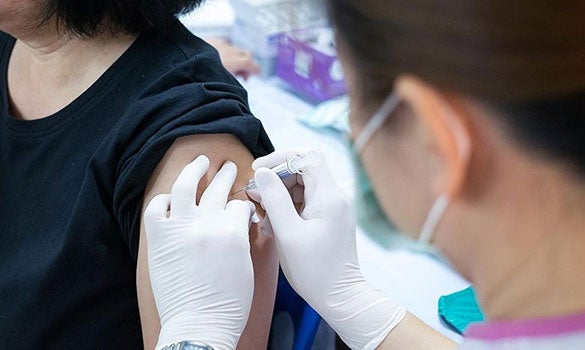
While some patients and caregivers are not convinced about the benefits of the pneumococcal vaccine, or fear side effects like pain at the injection site and fever, there are other deterrents such as the complexity of vaccination timings for adults and the higher pricing as compared with the flu vaccine. PHOTO: ISTOCKPHOTO
Despite it being the No. 2 killer here, too few are being vaccinated for related infections
Pneumonia is the No. 2 cause of death in Singapore, and cases of such fatalities have been rising steadily in recent years.
Yet, too few people are being vaccinated against the infections that cause it, The Straits Times has learnt.
The proportion of annual deaths due to the inflammatory lung disease has increased from 16.8 per cent in 2012 to 20.1 per cent in 2017, according to latest figures, or an increase from 3,100 deaths to 4,200.

Many of these deaths occurred in people with underlying medical conditions, the Ministry of Health (MOH) told The Straits Times.
Patients usually have difficulty breathing, and suffer from cough and chest pain due to fluid-congested lungs.
Certain groups of people - those aged 65 and older, very young children, people with chronic medical conditions and those with HIV or Aids - have a high risk of developing pneumonia.
Most of those in these groups are recommended to get vaccinated against common causes of the disease, such as the influenza virus and pneumococcus bacterial infection.
Today marks the start of World Immunisation Week, which aims to promote the use of vaccines to protect people against disease.
The World Health Organisation says that immunisation is widely recognised as one of the world's most successful and cost-effective health interventions.
But take-up for the pneumococcal vaccine remains low, with about 48,000 patients aged 18 and above using Medisave to pay for it from 2017 to last year, the MOH said.
This number is low, compared with the number of people recommended to get the vaccine under the National Adult Immunisation Schedule (Nais), which outlines specific groups of adults who should be vaccinated.
The Straits Times understands that the MOH does not keep track of the total number of people who are recommended to get the pneumococcal vaccine.
In comparison, a 2013 national survey - the most recent of its kind - found that between 14 per cent and 20 per cent of people aged 50 and above had taken the flu vaccination.
Doctors say there is a lack of awareness of the pneumococcal vaccine and a hesitancy to get it.
"The benefits of the vaccine and local supporting guidelines should be made readily available to the lay public at various points of contact with healthcare, to empower patients to bring up the topic of vaccines at their next consultation," said Dr Asok Kurup, an infectious diseases specialist at Farrer Park Hospital.
"Doctors can be busy in many outpatient clinics and bringing up topics of vaccination can take up valuable time. Nurse clinicians can also be given the responsibility for patient education."
Associate Professor Helen Oh, a senior consultant in the Department of Infectious Diseases at Changi General Hospital, said some patients and caregivers are not convinced about the benefits of the pneumococcal vaccine, or fear side effects like pain at the injection site and fever.
The complexity of vaccination timings for adults is also a deterrent.
Prof Oh said: "Age and overall health are key factors when administering the pneumococcal vaccine in patients, and they can lead to a different order of vaccines over different time periods - especially for patients with chronic medical conditions such as chronic heart or lung disease, diabetes, alcoholism and more."
Other immuno-compromising conditions, such as lymphoma, leukaemia and solid organ transplant, also impact the delivery of the vaccinations, she added.
Price could also be a factor.
At polyclinics, the Pneumococcal Polysaccharide Vaccine costs about $74, while the Pneumococcal Conjugate Vaccine (Prevnar 13/PCV13) costs $153.
In contrast, a flu vaccine can generally cost between $20 and $30.
Singaporeans can use up to $500 a year from their Medisave to pay for vaccines under Nais - including flu and pneumococcal vaccines - if they belong to the recommended groups.
New vaccines which protect against more strainsof pneumococcal infection are being developed by pharmaceutical companies.
MSD's V114 vaccine is currently undergoing Phase 3 trials in the United States, while Pfizer released results from the Phase 2 study of its 20vPnC vaccine at the 29th European Congress of Clinical Microbiology and Infectious Diseases held in Amsterdam earlier this month.
The results showed that antibodies which help kill pneumonia-causing bacteria increased for all 20 vaccines in over 400 participants.
Severe injection site reactions or side effects that affect the whole body or multiple organs occurred in less than 1 per cent of 20vPnC recipients, and no deaths or serious adverse events considered related to vaccines were reported in the study.













 Get it on Google Play
Get it on Google Play